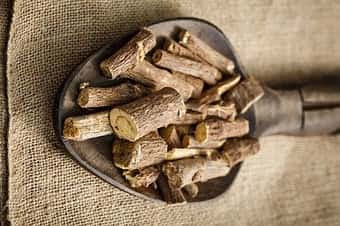Glycyrrhiza glabra: Plant Information
Licorice/Glycyrrhiza glabra is a perennial, 1 mm to 1.5 m
in height, woody-stemmed shrub with pinnate leaves, violet/purple to whitish
yellow flowers, oblong small pods filled with several seeds, leaflets just look
like a false acacia that expands in a warm climate of subtropical regions of
southern Europe and parts of western Asia, like India, China, and Pakistan.
English Names of licorice - Licorice root, Liquorice (in
British English), licorice (in American English), Sweet root, Liquiriti radix.
Hindi Names of licorice - Mulethi, Yashtimadhu,
Jethi-madh, Jyeshtamadhu, Mithilakdi, Kubas-susa.mulhathi, Mulhatti, Mulahetee.
Sanskrit Names of licorice - Jalayashti, Yashti madhukam,
Klitaka, Madhu-yashtikam, Madhuka, Sthalayashti, Yashtyawa, Yasti, Yastika.
Scientific Names of licorice - Glycyrrhiza glabra,
Glycyrrhiza uralensis, Glycyrrhiza hirsuta, Glycyrrhiza brachycarpa,
Glycyrrhiza glandulifera, Glycyrrhiza pallida, Glycyrrhiza violacea.
Constituents/ingredients of Licorice
Licorice root is stuffed with a number of chemical
constituents, including the next -
Glycyrmarin.
Glycyrrhizic acid.
Glycyrrhizinate.
Glycyrrhetic acid.
Glucuronic acid.
Glycyrrhizin.
Glabrene.
Potassium selenium.
Licochalcone A /LicoA.
Tannin.
Asparagin.
Resin.
Rutin.
Thymol.
Salicylic acid.
Amino acids.
Polysaccharides - Sugar/starch, glucose, sucrose,
mannose.
Phenol/Polyphenols/phenolic acids - Liquiritin, Flavones,
Flavans, Chalcones,
Isoflavonoids/Glabridin.
Gum.
Choline.
Manganese.
Phosphorus.
Magnesium.
Vitamin C.
Protein.
Calcium.
Fat.
Zinc.
Beta-carotene.
Iron.
Plant sterols.
Triterpenoids.
Isoliquiritigenin/chalcone.
Liquiritigenin.
Prunetin.
Mannitol.
Dehydroglyasperin C.
Enoxolone.
Lignin.
Flavonoids/isoflavonoids.
Licopyranocoumarin.
Licoarylcoumarin.
Glycycoumarin.
Formononetin.
Glisoflavone.
Quercetin.
Isoangustone A.
Hispaglabridins A and B.
Silicon.
Saponin.
Essential oil/volatile oil.
Health Benefits of Licorice Root/Glycyrrhiza glabra
How is licorice advantageous for your health?
Anti-inflammatory Properties & Activities of Licorice root that Fights Inflammation
Licorice root can be an Anti-inflammatory Ayurvedic agent
that treats different kinds of pain and swelling like arthritis, joint pain,
rheumatic disorders, joint stiffness, etc. via the body's own corticosteroid
system in which it stimulates the production of cortisone as well as
aldosterone hormones.
Licorice supports hormonal regulation in gynecological
conditions
Licorice can be employed as part of HRT (hormone
replacement therapy) in various gynecological diseases like menopausal
disorders (hot flash), PCOS (Polycystic ovarian syndrome) etc.
Licorice protects the skin
Is licorice best for your skin? Licorice topical
gel is very effective in the case of eczema, systemic lupus erythematosus,
acne/pimples, psoriasis, skin rash, abscesses, wound, and cuts because it comes
with an antibacterial property. Apart from this, it can help grow hair.
Tooth decay - Ayurvedic physicians often used licorice gel to eliminate
bacteria in the case of tooth rot.
Licorice & Respiratory problems
Licorice is a pleasant flavoring herb that has been used
as an expectorant folk medicine for thousands of years to treat a dry cough,
productive cough, asthma, bronchitis, congestion, hoarseness of voice, common
cold, sore throat, influenza and so on. It really is an effective component to
deal with any kind of respiratory infection that lessens the irritation of the
larynx, and soothes a cough and maintain a wholesome bronchial system.
Licorice is used in the conditions of different Abdominal
& Digestive disorders
What's
licorice a good laxative? - Licorice
soothes your stomach and improves gastrointestinal health Conditions. Licorice
root has Antiulcer, Laxative, Demulcent, Anti-flatulent properties to deal with
different digestive conditions like peptic ulcer, gastric ulcer, duodenal
ulcer, ulcerative colitis, constipation,
gastritis, Celiac disease, Crohn's disease, food poisoning, indigestion,
dyspepsia, stomach pains, heartburn, GERD (gastro-esophageal reflux disease),
nausea, and vomiting.
Some medical reports have established that licorice root
extract may repair the lining of the stomach by suppressing of H. pylori
(Helicobacter pylori) named bacteria that is a main causative organism for
peptic ulcer. Other than this, it may increase salivation, and diminish thirst.
Licorice May be utilized in Male Infertility Cases
Glycyrrhiza glabra or licorice extract can be used for
increasing sperm count, regarding male infertility.
Work as an anticancer
Licorice possesses antioxidant, and anticancer
efficacies, and capacity to produce some desired results in the cases of
various kind of cancer cell growth. It is beneficial, especially in breast, and
prostate cancers. Some medical researchers have explained about its cancer cell
killing properties that may assist stop the growth of malignant cells.
Hepatoprotective action
Licorice is an excellent hepato-protective natural herb
that helps to protect the liver in alcoholic cases and provide relief from
jaundice, and cirrhosis of liver/fatty liver disease after detoxification of
the body.
Use to care for Diabetes Mellitus
It is a well-known fact that licorice root offers us a
sweet flavor but an astonishing thing is that it can't enhance blood sugar
levels instead it has the capability to treat diabetes mellitus type 2.
Might Help With Weight Reduction
In patients with obesity, could be utilized it. Licorice
may assist in weight loss program after reducing extra fat accumulation of the
body.
Lessen the potential Risks of Coronary Diseases
Deglycyrrhizinated licorice consumption may lower total
cholesterol and high blood pressure.
Licorice treats Infections
Licorice is a well known antibacterial, antiviral, and
anti-fungal agent in the Ayurvedic arrangement of medicines, as it stimulates
the immunity power using its own antioxidant properties.
Licorice Reduces Stress, Aids with Fatigue & Helps
You Sleep
Licorice (Glycyrrhiza glabra) is an adaptogenic agent
that will help induce sleep and remove any kind of mental tension, anxiety, and
increase sleeping duration because it promotes a healthy level of adrenaline,
and cortisol in the blood.
Other than this, licorice can increase the energy of the
body that is clearly a superb action to help with fatigue and tiredness.
Licorice Protects the Brain
Licorice stuffed with flavonoid may be used in the case
of Alzheimer's disease, dementia, multiple sclerosis, stroke injuries concerned
to brain & seizure-induced brain cell death because it enhances antioxidant
levels in the brain.
Some other therapeutic and restorative efficacies are hepatitis, herpes, ophthalmic diseases,
urinary tract infection, allergies, adrenocortical insufficiency, Addison's
disease, diabetes insipidus, malaria, tuberculosis, chronic fatigue syndrome,
recovery after surgery, autoimmune disorders, and aphrodisiac, in nature.
Medication
Dosage of Licorice
DGL - 1 - 4 gms.
in the divided dosage, either in the form of dried root powder or as a
decoction or as directed by physician because ingesting more than 8 oz. of
licorice per day may be harmful.
Cautions, Contraindications and Possible side effects of
Licorice
As said above, licorice has a lot of health advantages
but precautions/safety measures should be followed or take an advice with an Ayurvedic
expert prior to using it because too much consumption may cause some negative
effects. These health problems delivered due to the glycyrrhizic acid of
licorice and to avoid complications, and adverse reactions, one can use DGL
(deglycyrrhizinated licorice) which is obtainable in the form of tea, lozenges,
chewable tablets, powder, liquid extracts, and capsules in the market.
Too much consumption of glycyrrhizin (an active element
of licorice) may deliver high blood pressure (hypertension), headache, fatigue,
muscular weakness, body-ache, potassium loss (hypokalaemia), sodium, and water
retention, electrolyte imbalance, edema, weight gain, mineralocorticoid
syndrome, heart problems/arrhythmia/irregular heartbeat/cardiac arrest,
shortness of breath, pseudo-aldosteronism, kidney failure, paralysis due to the
bad effects of an elevated cortisol levels (altered steroid hormonal
activities) of the adrenal glands.
An increased dosage of licorice can slow down drug
(diuretics and anti-hypertensive drugs) metabolism, liver disease, and
hypertonia.
Always remember, seek advice from your physician before
utilization of licorice.
During pregnancy period, make an integral separation from
licorice root because it can cause different problems like, increased levels of
prostaglandin hormone, and uterine contractions that lead to abortion due to
estrogenic hyperactivities, as well as premature labor.
Lactating/breastfeeding mother should avoid in taking of
licorice root in any form.
An excessive dosage of licorice root should not be in
taken for an extended period.
In male being, it may lessen the level of testosterone
and aldosterone.
References
WRITTEN BY RAJESH KUMAR













No comments:
Post a Comment